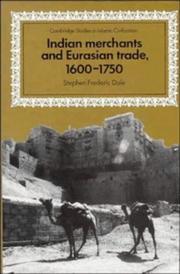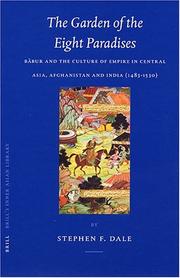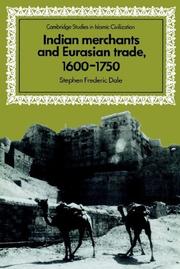| Listing 1 - 10 of 13 | << page >> |
Sort by
|

ISBN: 1896357040 Year: 2001 Publisher: Toronto, Ont. Between the Lines
Abstract | Keywords | Export | Availability | Bookmark
 Loading...
Loading...Choose an application
- Reference Manager
- EndNote
- RefWorks (Direct export to RefWorks)
Multi
ISBN: 9780521870955 9780521691420 0521691427 052187095X 9780511818646 1316183688 131618319X 0511818645 Year: 2010 Volume: 5 Publisher: Cambridge Cambridge University Press
Abstract | Keywords | Export | Availability | Bookmark
 Loading...
Loading...Choose an application
- Reference Manager
- EndNote
- RefWorks (Direct export to RefWorks)
Between 1453 and 1526 Muslims founded three major states in the Mediterranean, Iran and South Asia: respectively the Ottoman, Safavid, and Mughal empires. By the early seventeenth century their descendants controlled territories that encompassed much of the Muslim world, stretching from the Balkans and North Africa to the Bay of Bengal and including a combined population of between 130 and 160 million people. This book is the first comparative study of the politics, religion, and culture of these three empires between 1300 and 1923. At the heart of the analysis is Islam, and how it impacted on the political and military structures, the economy, language, literature and religious traditions of these great empires. This original and sophisticated study provides an antidote to the modern view of Muslim societies by illustrating the complexity, humanity and vitality of these empires, empires that cannot be reduced simply to religious doctrine.
Iraq --- Mogul Empire --- Empire ottoman --- Empire moghol --- Mogul Empire. --- MUSLIM WORLD -- 930.3 --- History of Asia --- anno 800-1199 --- anno 1200-1799 --- India --- Iran --- Asian Turkey --- Turkey --- History --- Histoire --- Moghul Empire --- Mughal Empire --- Mugala Empire --- Ottoman Empire, 1288-1918 --- Mughal Empire.

ISBN: 0521454603 0521525977 0511523971 Year: 1994 Publisher: Cambridge Cambridge University press
Abstract | Keywords | Export | Availability | Bookmark
 Loading...
Loading...Choose an application
- Reference Manager
- EndNote
- RefWorks (Direct export to RefWorks)
In this remarkable 1994 work of comparative economic history, Stephen Dale studies the activities and economic significance of the Indian mercantile communities which traded in Iran, Central Asia and Russia in the seventeenth and eighteenth centuries. The author uses Russian sources, hitherto largely ignored, to show that these merchants represented part of the hegemonic trade diaspora of the Indian world economy, thus challenging the conventional interpretation of world economic history that European merchants overwhelmed their Asian counterparts in the early modern era. The book not only demonstrates the vitality of Indian mercantile capitalism, but also offers a unique insight into the social characteristics of an Indian expatriate trading community in the Volga-Caspian port of Astrakhan.
History of Asia --- anno 1600-1699 --- anno 1700-1799 --- Central Asia --- South Asia --- Eurasia --- India --- Indland --- Ḣindiston Respublikasi --- Republic of India --- Bhārata --- Indii︠a︡ --- Inde --- Indië --- Indien --- Sāthāranarat ʻIndīa --- Yin-tu --- Bharat --- Government of India --- インド --- Indo --- Asia --- Europe --- Commerce --- History. --- History --- India - Commerce - Eurasia - History. --- Eurasia - Commerce - India - History. --- هند --- Индия --- Arts and Humanities

ISBN: 1429427485 9781429427487 9004137076 9789004137073 9789047413141 9047413148 Year: 2004 Publisher: Leiden Boston Brill
Abstract | Keywords | Export | Availability | Bookmark
 Loading...
Loading...Choose an application
- Reference Manager
- EndNote
- RefWorks (Direct export to RefWorks)
"This is the biography of Zahir al-Din Muhammad Babur, the founder of one of the great premodern Islamic empires, the Timurid-Mughul empire of India. It contains an original evaluation of his life and writings as well as fresh insights into both the nature of empire building and the character of the Timurid-Mughul state." "Based upon recently published critical editions of Babur's autobiography and poetry, the book examines Babur's life from the time he inherited his father's authority in the Ferghanah valley, east of Samarqand, in 1494, until his death in Agra, India in 1530. The book is written in an alternating series of thematic and narrative chapters. The thematic or analytical chapters examine his major writings, discuss his cultural personality and his reaction to Indian culture, while the narrative chapters relate the story of his life while critically commenting on his autobiographical intent." "The book contributes to the history of the Timurid period, the study of early modern Islamic empires and the nature of autobiographical literature in Islamic and Asian societies. It is illustrated with fifteen colour plates and four maps."--Jacket.
Afghanistan --- Regions & Countries - Asia & the Middle East --- History & Archaeology --- South Asia --- History --- Babur, --- Zahīr al-Dīn Muḥammad, --- Muḥammad Bābar, Ẓahīr al-Dīn, --- Zakhir ad-Din Mukhammed Babur, --- Babur, Zakhir ad-Din Mukhammed, --- Zakhiriddin Mukhammad Babur, --- Babur, Zakhiriddin Mukhammad, --- Bobir, Zahiriddin Muhammad, --- Zahiriddin Muhammad Bobir, --- Zahiruddin Muhammed Babur, --- Baber, --- Babar, --- Babyr, Zakhir ad-din Mūkhammed, --- Bobur, Zaḣiriddin Muḣammad, --- Ẓahīr al-Dīn Muḥammad Bābur, --- Zahīru Dīn Muhanmado Bāburu, --- Bābara, Zahīruddīna Mohammada, --- Mohammada Bābara, Zahīruddīna, --- Zahīruddīna Mohammada Bābara, --- Zahiruddin Mohd. Babur, --- Babur, Zahiruddin Mohd., --- Bābar, Ẓahīruddīn Muḥammad, --- Ẓahīruddīn Muḥammad Bābar, --- Bābarshāh, Ẓahīr al-Dīn Muḥammad, --- Bāburshāh, Ẓahīr al-Dīn Muḥammad, --- Ẓahīr al-Dīn Muḥammad Bābarshāh, --- Babyr, Zahyreddin Muhammet, --- بابر، --- ،ظهير الدين محمد بابرشاه --- بابرشاه، ظهير الدين محمد، --- ظهير الدين محمد بابر, --- بابر، --- Asia, Central --- India --- History. --- Kings and rulers --- Babur --- Asia [Central] --- Biography --- 1000-1765 --- Regions & Countries --- Czars (Kings and rulers) --- Kings and rulers, Primitive --- Monarchs --- Royalty --- Rulers --- Sovereigns --- Tsars --- Tzars --- Heads of state --- Queens
Book
ISBN: 1316227553 1108470076 Year: 2018 Publisher: Cambridge : Cambridge University Press,
Abstract | Keywords | Export | Availability | Bookmark
 Loading...
Loading...Choose an application
- Reference Manager
- EndNote
- RefWorks (Direct export to RefWorks)
This book is a concise biography of Babur, who founded the Timurid-Mughal Empire of South Asia. Based primarily on his autobiography and existential verse, it chronicles the life and career of a Central Asian, Turco-Mongol Muslim who, driven from his homeland by Uzbeks in 1504, ruled Kabul for two decades before invading 'Hindustan' in 1526. It offers a revealing portrait of Babur's Perso-Islamic culture, Timurid imperial ambition and turbulent emotional life. It is, above all, a humanistic portrait of an individual, who even as he triumphed in South Asia, suffered the regretful anguish of an exile who felt himself to be a stranger in a strange land.
Babur, --- Zahīr al-Dīn Muḥammad, --- Muḥammad Bābar, Ẓahīr al-Dīn, --- Zakhir ad-Din Mukhammed Babur, --- Babur, Zakhir ad-Din Mukhammed, --- Zakhiriddin Mukhammad Babur, --- Babur, Zakhiriddin Mukhammad, --- Bobir, Zahiriddin Muhammad, --- Zahiriddin Muhammad Bobir, --- Zahiruddin Muhammed Babur, --- Baber, --- Babar, --- Babyr, Zakhir ad-din Mūkhammed, --- Bobur, Zaḣiriddin Muḣammad, --- Ẓahīr al-Dīn Muḥammad Bābur, --- Zahīru Dīn Muhanmado Bāburu, --- Bābara, Zahīruddīna Mohammada, --- Mohammada Bābara, Zahīruddīna, --- Zahīruddīna Mohammada Bābara, --- Zahiruddin Mohd. Babur, --- Babur, Zahiruddin Mohd., --- Bābar, Ẓahīruddīn Muḥammad, --- Ẓahīruddīn Muḥammad Bābar, --- Bābarshāh, Ẓahīr al-Dīn Muḥammad, --- Bāburshāh, Ẓahīr al-Dīn Muḥammad, --- Ẓahīr al-Dīn Muḥammad Bābarshāh, --- Babyr, Zahyreddin Muhammet, --- بابر، --- ،ظهير الدين محمد بابرشاه --- بابرشاه، ظهير الدين محمد، --- ظهير الدين محمد بابر, --- بابر، --- Mogul Empire --- History. --- Kings and rulers --- Mughal Empire
Book
ISBN: 9780674967656 Year: 2015 Publisher: Cambridge (Mass.) : Harvard university press,
Abstract | Keywords | Export | Availability | Bookmark
 Loading...
Loading...Choose an application
- Reference Manager
- EndNote
- RefWorks (Direct export to RefWorks)
Historians --- Historians. --- Historiography --- Historiography. --- History --- History --- Islamic learning and scholarship --- Islamic learning and scholarship. --- Philosophy. --- Philosophy. --- History. --- Islamic Empire. --- North Africa.
Book
ISBN: 9780674495807 Year: 2015 Publisher: Cambridge, MA
Abstract | Keywords | Export | Availability | Bookmark
 Loading...
Loading...Choose an application
- Reference Manager
- EndNote
- RefWorks (Direct export to RefWorks)
Multi
ISBN: 9781316227558 9781108470070 9781107107267 Year: 2018 Publisher: Cambridge Cambridge University Press
Abstract | Keywords | Export | Availability | Bookmark
 Loading...
Loading...Choose an application
- Reference Manager
- EndNote
- RefWorks (Direct export to RefWorks)

ISBN: 9780511523977 9780521454605 9780521525978 Year: 1994 Publisher: Cambridge Cambridge University Press
Abstract | Keywords | Export | Availability | Bookmark
 Loading...
Loading...Choose an application
- Reference Manager
- EndNote
- RefWorks (Direct export to RefWorks)
Book
ISBN: 9041131396 9789041131393 Year: 2009 Publisher: Alphen aan den Rijn: Kluwer law international,
Abstract | Keywords | Export | Availability | Bookmark
 Loading...
Loading...Choose an application
- Reference Manager
- EndNote
- RefWorks (Direct export to RefWorks)
| Listing 1 - 10 of 13 | << page >> |
Sort by
|

 Search
Search Feedback
Feedback About UniCat
About UniCat  Help
Help News
News